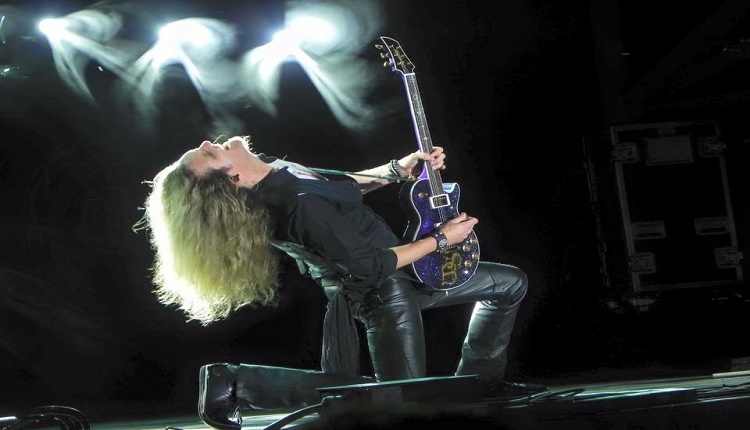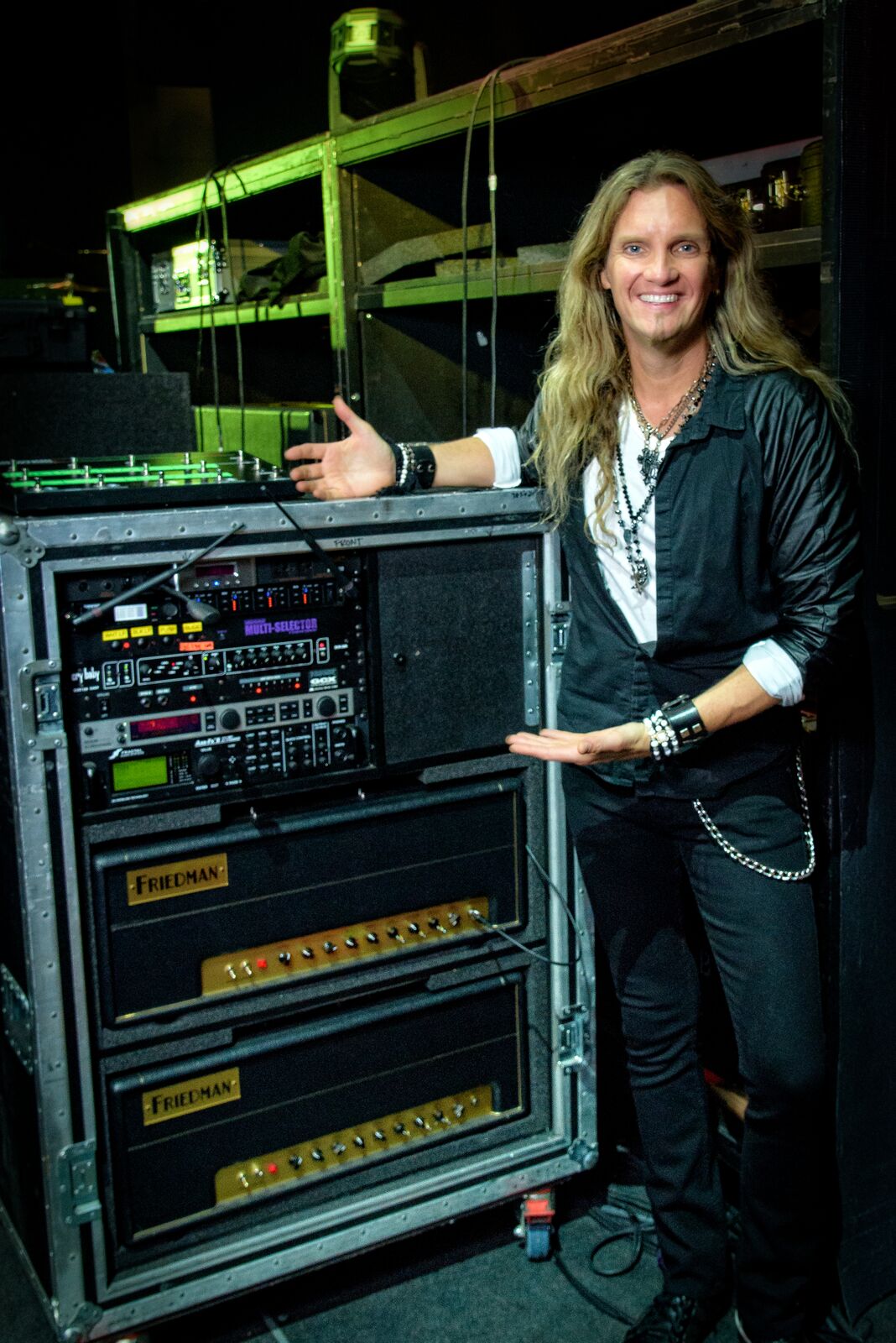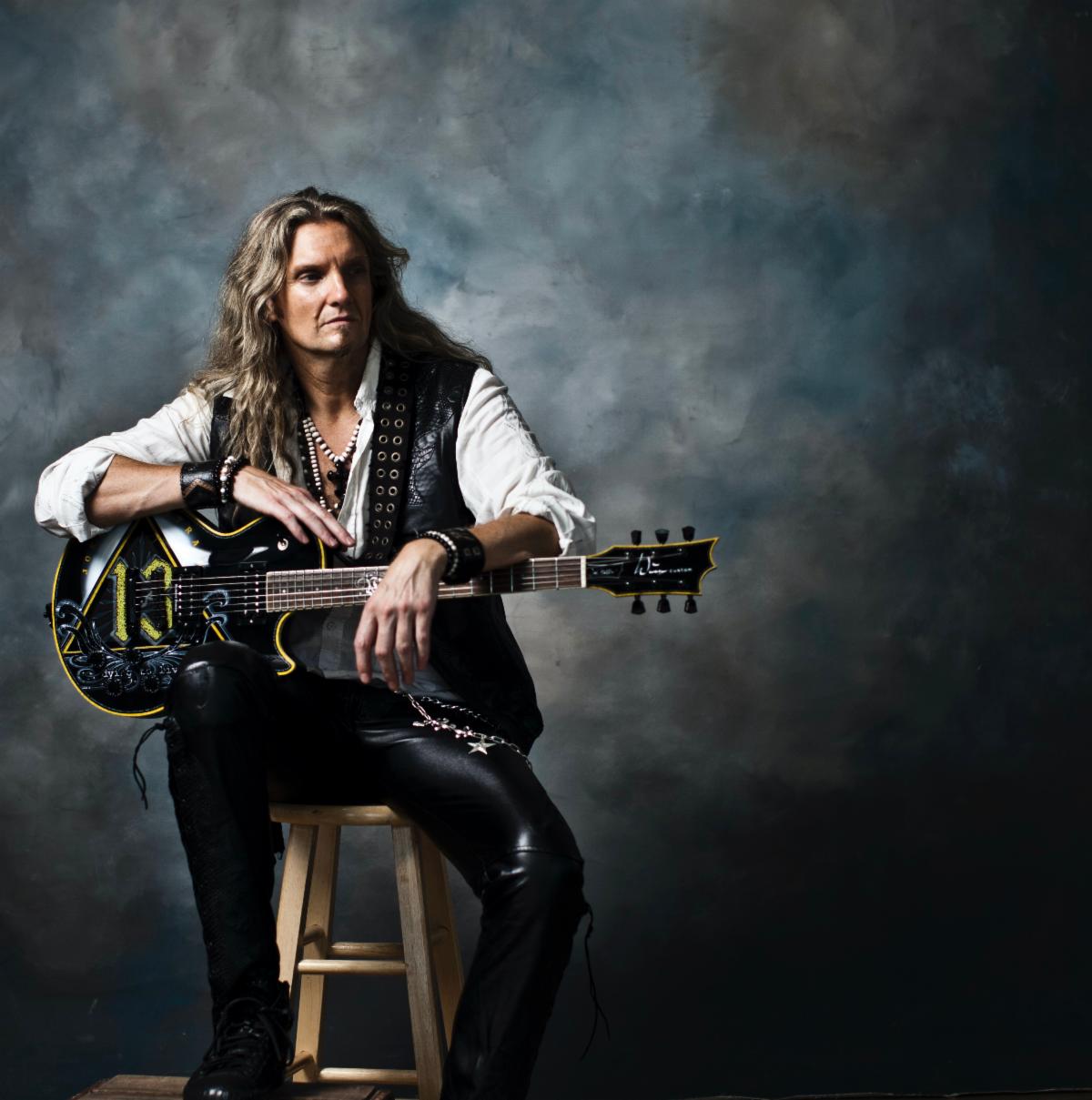All images courtesy of Freeman Promotions
Navigating through the uncharted waters of a global pandemic has undoubtedly presented a unique set of challenges for us all.
Veteran guitarist Joel Hoekstra, however, continues to persevere through adversity.
The multi-faceted guitarist, whose illustrious resume includes but isn’t limited to Whitesnake, Trans-Siberian Orchestra, Night Ranger, and Broadway’s Rock of Ages utilized the prolonged inactivity to carve out some much-needed time for a project of his own.
Hoekstra’s solo album, Running Games, the acclaimed second installment under the “Joel Hoekstra’s 13” moniker, was released nine days ago by way of Frontiers Music. His latest album, which Hoekstra describes as, “Dio-ish at its heaviest and Foreigner at its lightest,” reunites a superb supporting cast of musicians which includes Russell Allen (vocals), and Tony Franklin (bass), Vinny Appice (drums), and keyboardist Derek Sherinian.
Amid the buzz of his new album, teaching guitar via Skype, session work, and Masterclasses for Rock ‘n Roll Fantasy Camp, Joel was kind enough to take time out of his restless schedule to sit with me to discuss Running Games, various stops throughout his decorated career, what lies ahead, and much more.
Andrew:
First and foremost, how have you navigated through the pandemic so far?
Joel:
I’m busier than ever. Definitely working really hard, just a totally different brand of working hard then it’s been the past 20 years or so for me. I’ve gone from being on the road 285 days of the year in 2019 to just a whole mixture of things to stay busy at home. I like to think I’m productive every day moving forward and in reality, busier than ever.
Andrew:
At what age did you first pick up a guitar and who were some of your influences?
Joel:
I was 11 and definitely AC/DC. Angus Young inspired me, just his whole energy and stage presence in addition to his great songs and playing. I was very narrow-minded early on; I was very much into hard rock and heavy metal. Just AC/DC, Black Sabbath, Ozzy, Iron Maiden, Scorpions, but I definitely branched out a lot from there, to the point where music is music.
Andrew:
Your parents are classical musicians. You mentioned the AC/DC influence, but does classical music influence your playing?
Joel:
Well, I think my parents really didn’t know what I was headed towards when I asked for a guitar [laughs]. But I think one of the first times I cranked the home stereo to ten with my guitar plugged into it was the first time they had an idea that I wasn’t going to be [Andres] Segovia. I would say that it definitely helped, all that playing piano and cello when I was young helped me when it comes to learning the guitar quicker. A lot of the fundamentals were there; classical music is definitely a part of my taste. I mean, I think rock is definitely the main thing for me, but I did spend a couple of years doing classical guitar in college as well. It’s definitely in there; it influenced my right-hand technique more than anything else. I do a lot of finger-picking when I play, compared to most electrical guitarists.

Andrew:
In 2008, you joined Night Ranger and ended up becoming the permanent replacement for Jeff Watson. How did that come to be?
Joel:
I had a great time with those guys, a great seven years. It really came to be through me being in the house band for Jim Peterik with his band called World Stage. He had these events once a year, basically, and have his friends come and sing their hits. Kelly Keagy from Night Ranger, the drummer, was one of the guests pretty much every year. So, I played the Night Ranger stuff with him and we’d see each other like once a year – it was about six, seven years before I had the opportunity to get my foot in the door. They needed somebody for one show, I filled in, and that was basically my audition.
Andrew:
You appeared on Broadway with Rock of Ages for six years and also appeared in the 2012 film. Can you talk a bit about that experience?
Joel:
Yeah, I was definitely more of a fan of the Broadway show than the movie. I think the movie had a different script and kind of lost the concept, being raunchy and poking fun at itself. It just kind of lost its identity. But, it was great fun filming the scene with those guys down there — Sebastian Bach, Nuno Bettencourt, Kevin Cronin from REO [Speedwagon], Debbie Gibson, and myself. I got to hang with them for a few days down there, and that was worth its weight in gold. It was great, and also just getting to know the actors a little bit – Tom Cruise and Russell Brand, and that was fun.
The show itself, that really changed my life. I mean, that was much more important than the cameo in the movie. That was having the ability to take off whenever I needed to tour with Night Ranger and Trans-Siberian Orchestra during that six-year run, which basically allowed me to have a gig almost every day for six years. So, I went from being a guitar player who was kind of well-known, to somebody who a lot of people had heard of with a little bit of money in the bank. Those six years really changed my life.
Andrew:
Your career has taken some interesting paths, including touring with the legendary Cher (2018-2020). How were you able to blend your predominantly Rock background with the Pop and Classical to make it your own?
Joel:
I basically just played it down like the guy I was filling in for. I was filling in for Dave Barry, and I just played it very much like him, except for a couple of step-out moments. I kind of made those my own a little bit in terms of stage presence and maybe some flash, maybe more technical playing. But, basically, I just played it down as he did. That was my MO going to fill in, and it ended up becoming more of a permanent situation for three-four years.

Andrew:
In 2015, you released a solo album entitled Dying to Live under the Joel Hoekstra’s 13 moniker. Can you talk about the band formulation and your vision of the project?
Joel:
Well, I had in mind making an album that basically just sounded like a band. But, I wanted to be the guy to do the writing and basically call the shots on it, be in charge of the mix, etc. I brought that up to Tony Franklin, we had just finished doing a different project together, and he was into it as far as playing bass. I asked him who he’d want to use on drums, and he recommended Vinny Appice, and I thought, “Great, we have this kind of Dio-ish thing forming here. That could be really cool.” Right at that time, Russell Allen joined Trans-Siberian Orchestra, so the more I heard of him, I thought, “This guy’s perfect.” He could sing the heavy metal Dio style, but he can also sing soulful like some of the stuff I dig, the blues-based stuff, poppy stuff like Foreigner, Bad Company, and Whitesnake. And Derek Sherinian, he’s really the go-to guy for great keyboard sounds and solos, so that was a no-brainer. Jeff Scott Soto helped me out singing half of the leads on that record, but basically all of the backgrounds, which was the biggest thing for me. He does such a good job at that. That just allowed me to focus on the writing, the production end of things, and of course the guitar playing. That’s how it came together.
Andrew:
We know about Joel Hoekstra, the multi-faceted guitarist, but let’s talk about Joel Hoekstra the songwriter.
Joel:
Well, with this, I’m just coming from the place of just trying to connect to what I like as a listener in this style, which is melodic hard rock that I described as Dio-ish at its heaviest and Foreigner at its lightest. So, I try to come from the standpoint of being a listener more than being a guitar player. It’s not about self-indulgent solos or writing these progressive songs. I just want to write some really good, solid Hard Rock songs, man. That’s pretty much the MO; I basically build songs chorus first, so I’ll write a chorus, and then I’ll write the guitar riffs and have a melody going – I find it really difficult to write without singing. So, I usually have a melody in mind. Then, from there, that goes to Vinny and Tony, and then I finish the rest of the lyrics. So, I’m not too concerned about the verse lyrics, etc, at first; just the point of the song, if that makes sense. In a separate writing session, I’ll fill in the rest of the lyrics.
Andrew:
So, six years later, Running Games is released. Given the hectic schedules of everyone involved, how long was this particular project in the works, and when was it finally recorded?
Joel:
I don’t remember exactly when it started. Like I said, I laid the guitar riffs down to a click, and then there’s also a guitar playing the melody and that’s what Vinny and Tony record to. And they were done, and then I write the lyrics and record myself singing a guide vocal for Russell – he just sings it a whole lot better than me. But he basically had recorded himself singing three or four songs by the time Covid hit, so that’s where we were – we had Vinny and Tony done, and Russell on three or four songs. It definitely helped expedite things, having everybody’s schedules free up. So, that’s a silver lining, for sure.
Andrew:
What were some of the challenges of recording during a pandemic and what were some of the channels you had to utilize to complete the album?
Joel:
You know, it didn’t really change a whole lot. The last [album] we did with file sharing as well. The only difference is, that I used a real amp on the previous album, whereas in this one, I used plug-ins. Honestly, kind of liked the results I got better with the plug-ins on this one anyway [laughs], so I don’t know that it’s necessarily anything negative, man. I think this file sharing thing and everybody working at home is a really positive thing. It allows people to record when they’re inspired, and they can do so without feeling self-conscious or like they’re paying a million dollars an hour for a room. People just do as many takes as they want, and I think that’s the way to get the best takes out of people.
Andrew:
Did you see any band members at any point during recordings or was it strictly file sharing?
Joel:
No, it was one-hundred percent file sharing. One-hundred percent. I’m actually the guy that’s sticking up for that nowadays. Because I think everybody was so into that, “Hey, let’s get into a room and vibe and everything,” and I’m like, “Yeah, that’s a lot of money.” People usually settle on a take because they don’t want to be the guy to go, “Hey, I’d really like to do it again.” When you’re at home alone, everyone has their sounds really dialed in from their home studios. People can do as many takes as they want without feeling self-conscious about it. I tend to think of it as a positive. I worked at the pace of basically a song a night with the rhythms and then I worked on a song a night with the leads. I broke it up, so I was just working on it for like three hours a night or something like that. So, I wasn’t killing myself doing 12, 13-hour days on just the album. I felt like I was coming at it from a place of being inspired.
Andrew:
What do you enjoy most about your Joel Hoekstra’s 13 creation?
Joel:
I’d say it’s the opportunity to actually write everything. Not just write the guitar riffs or some of the guitar riffs, but all of the guitar riffs and write all of the vocal melodies and all of the lyrics. That’s definitely the fun part for me.
Andrew:
Are there any plans for a support tour once we can all safely attend live shows?
Joel:
Well, we did do a show in support of Dying to Live on the Monsters of Rock Cruise. So, it’s happened, and I would certainly look to make it happen. At this stage of the game, let’s get the world open and take it from there. I’d love to do a run with it, for sure.
Andrew:
In your words, how would you describe the current state of the music industry?
Joel:
The music industry, to me, always looks a lot like my profession [laughs]. I’m not necessarily a big-picture guy. I would like to see the streaming thing get ironed out and have the artist make more money from streaming. I think that’s only fair. And have these services make less. Outside of that, I just like being able to move forward, be productive, and make a living doing this.
Andrew:
What’s next on your docket?
Joel:
So, I’m just gonna kind of keep moving forward with everything I’ve been doing, man. I’ve been teaching one-on-one on Skype, I have Masterclasses for Rock ‘n Roll Fantasy Camp, Cameos – personalized greetings. That’s kind of the stuff that’s paying the bills for me right now. I’ve been doing sessions for people, and guest solos, and I’m guesting on people’s tracks regularly. Doing quarantine videos to kind of just do fun stuff and collaborate with people. Of course, I’ve got the album out; that’s a no-brainer.
In addition to that, I’ve just turned in the riffs to Michael Sweet for our project with Nathan James. Michael took the guitar riffs and he’s basically arranging them and turning them into songs. So, it was my job to do the riffs with this one. We’ll see what happens, man; it’s going to be very collaborative. There’s a lot of very talented people involved with that project.

Interested in learning more about Joel Hoekstra’s new album? Check out the link below:
Dig this article? Check out the full archives of Shredful Compositions, by Andrew DiCecco, here: https://vwmusicrocks.com/shredful-compositions-archives/
